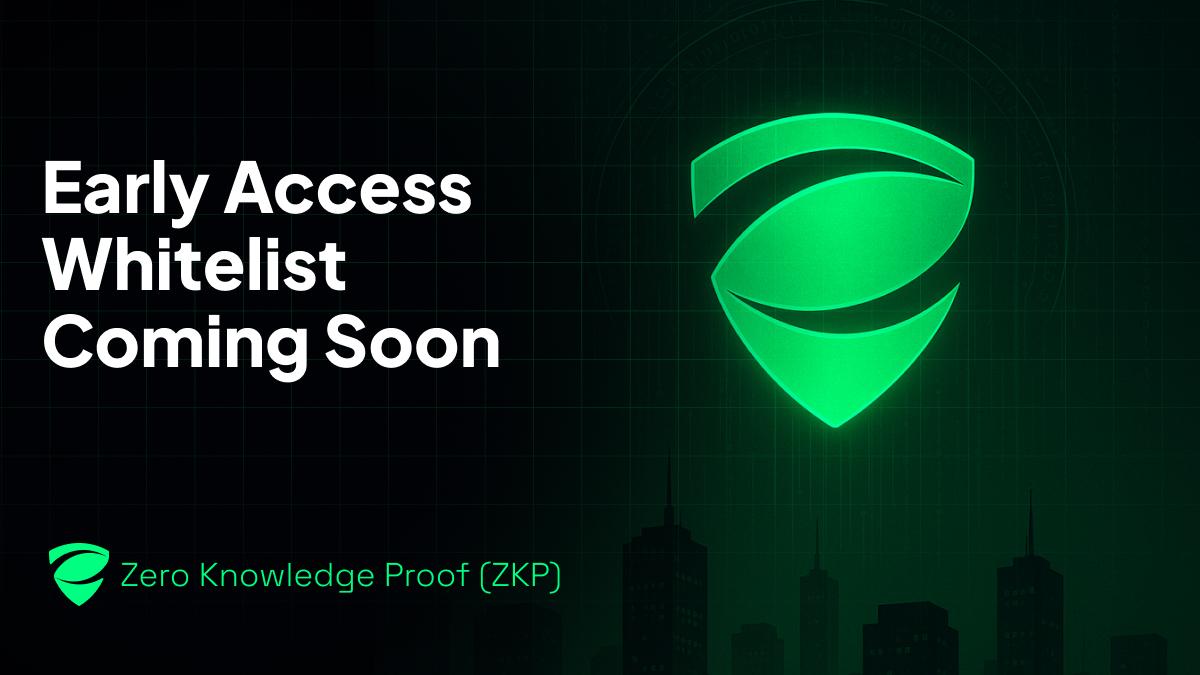Coindoo - 10/20/2025 7:30:43 PM - GMT (+0 )
- 20 October 2025
- |
- 22:30
Zero Knowledge Proof (ZKP) is ending blockchain’s “public-by-default” era. With privacy as its foundation, it redefines trust, scalability, and security for global adoption.
For years, blockchain’s biggest selling point was its transparency. Every transaction visible, every record public — a feature once hailed as revolutionary. But that same openness has become its Achilles’ heel. Businesses can’t protect trade data, individuals can’t safeguard financial privacy, and institutions won’t adopt systems that expose sensitive information by design. Zero Knowledge Proof (ZKP) recognizes this problem not as a bug, but as proof that the transparent ledger experiment has failed. Its mission is clear: build a blockchain that maintains verifiability without sacrificing privacy. The whitelist that will open soon is the final opportunity for presale access to a protocol redefining what blockchain should be.
Section 1: Why Transparency Became a ProblemWhen blockchain first gained attention, transparency was marketed as the antidote to corruption. Everyone could verify everything — an open book for the digital economy. But as adoption spread, reality hit hard. Not everyone wants their wallet balance, transaction history, or business activity broadcast to the world. For enterprises, this was a dealbreaker. For individuals, it meant sacrificing privacy for participation.
Zero Knowledge Proof (ZKP) directly addresses this long-standing issue. It allows users to prove a transaction’s validity without exposing the data behind it. No leaking of financial records, no public trails, no compromises.
Key takeaways:
- Transparency helped early adoption but blocked mainstream entry.
- Businesses require confidentiality to comply with privacy regulations.
- Zero Knowledge Proof (ZKP) transforms visibility into verifiability — private, secure, and trusted.
It’s not about hiding information; it’s about protecting what matters.
Section 2: From Public Ledger to Trust SystemZero Knowledge Proof (ZKP) shifts the very definition of blockchain trust. Instead of proving honesty through exposure, it builds trust through cryptography. This evolution replaces “public-by-default” with “provable-by-design.”
Here’s what that means in practice:
- zk-SNARKs and zk-STARKs create mathematical proofs that confirm validity without revealing data.
- Selective disclosure allows compliance without total transparency.
- Shielded smart contracts execute private logic while maintaining auditability.
This is a paradigm shift. Instead of transparency equaling trust, Zero Knowledge Proof (ZKP) makes privacy the new foundation of trust. The result is a blockchain that can finally serve both individuals and institutions — secure for enterprises, private for users, and scalable for global demand.
The transparent ledger experiment was the first draft. This is the rewrite — a blockchain that earns trust without giving away secrets.
Section 3: A Blueprint for Global AdoptionThe future of blockchain adoption won’t be decided by hype, but by usability. Zero Knowledge Proof (ZKP) knows that privacy and scalability aren’t optional — they’re essential. Its architecture combines advanced cryptography with a modular design, enabling upgrades without forks and ensuring long-term flexibility.
The project’s roadmap is built for endurance:
- Phase 1: Foundation — base Layer 1 with zk-transactions.
- Phase 2: Scaling — zk-Rollups and recursive proofs.
- Phase 3: Ecosystem expansion — DeFi, identity, NFTs, gaming.
- Phase 4: Interoperability — bridges with Ethereum, Solana, and more.
Each stage unlocks practical use cases while strengthening the network’s privacy-first ethos. Zero Knowledge Proof (ZKP) isn’t chasing trends; it’s solving structural issues that have limited blockchain adoption for a decade. Privacy and scalability together — not as features, but as fundamentals.
Section 4: The Whitelist and the Paradigm ShiftThe upcoming whitelist for Zero Knowledge Proof (ZKP) isn’t just about presale access — it’s a marker in blockchain history. It represents the final entry point before the public ledger era gives way to private, scalable trust systems. This isn’t a temporary phase; it’s the next chapter of decentralization.
Participants who secure whitelist access position themselves at the intersection of two monumental shifts:
- The end of the transparent ledger experiment, where privacy becomes a requirement, not an option.
- The beginning of the privacy-first blockchain age, powered by verifiable computation and selective visibility.
Zero Knowledge Proof (ZKP) isn’t improving on transparency — it’s replacing it. The whitelist is the last presale access window before that transformation fully begins, opening the door to the technology redefining the blockchain’s future identity.
Summing UpThe blockchain industry spent a decade learning that full transparency isn’t sustainable. The next decade belongs to privacy-driven trust systems — and Zero Knowledge Proof (ZKP) is leading that shift. By proving validity without exposure, it transforms the blockchain’s role from a transparent ledger into a protected network for real-world adoption. Enterprises can operate securely, individuals can transact confidently, and innovation can scale responsibly. The upcoming whitelist isn’t the destination; it’s the transition point — the bridge between what blockchain was and what it’s becoming. With Zero Knowledge Proof (ZKP), the era of blind transparency is closing, and the future of private trust is beginning.
This publication is sponsored. Coindoo does not endorse or assume responsibility for the content, accuracy, quality, advertising, products, or any other materials on this page. Readers are encouraged to conduct their own research before engaging in any cryptocurrency-related actions. Coindoo will not be liable, directly or indirectly, for any damages or losses resulting from the use of or reliance on any content, goods, or services mentioned. Always do your own research.
Reporter at Coindoo
Krasimir Rusev is a journalist with many years of experience in covering cryptocurrencies and financial markets. He specializes in analysis, news, and forecasts for digital assets, providing readers with in-depth and reliable information on the latest market trends. His expertise and professionalism make him a valuable source of information for investors, traders, and anyone who follows the dynamics of the crypto world.
read more







